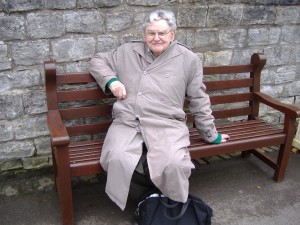Trinidad
Sieber, Franz Wilhelm
Franz Wilhelm Sieber (1789-1844) was born in Prague and became a widely-travelled botanist, plant collector and explorer.
According to Thorwald C. Franke [1255.352] Sieber favoured Atlantis in the Americas and offered discoveries in Trinidad to support this idea.
Sadly, Sieber was an eccentric person who eventually deteriorated into complete madness, ending his days in a Prague insane asylum(a).
Ashe, Geoffrey *
*Geoffrey Ashe (1923- ) is a recognised authority on the Arthurian Legend and has written extensively on the subject. He is the author or co-author of a number of books, including The Quest for Arthur’s Britain, Camelot and the Vision of Albion, The Discovery of King Arthur, and Mythology of the British Isles. He was co-founder and secretary of the Camelot Research Committee that  excavated Cadbury Castle in Somerset. He was Associate Editor of The Arthurian Encyclopaedia and The New Arthurian Encyclopaedia; collaborated with Norris Lacy on The Arthurian Handbook, and has held visiting professorships at several American universities.
excavated Cadbury Castle in Somerset. He was Associate Editor of The Arthurian Encyclopaedia and The New Arthurian Encyclopaedia; collaborated with Norris Lacy on The Arthurian Handbook, and has held visiting professorships at several American universities.
In the fifth century, the neo-Platonist Proclus, quoting a first-century BC geographer named Marcellus, spoke of three islands of ‘immense extent’ located in the Atlantic Ocean. The inhabitants of the central one of these islands was said to have preserved the memory of a former landmass, identified by Proclus with Atlantis, which had existed thereabouts. In 1962, historian Ashe identified Marcellus’ three great islands with the Greater Antilles of the Caribbean. Moreover, he pointed out that the indigenous peoples of the region preserved the memory of a cataclysm, which had split up a former landmass leaving behind the islands that make the archipelagos, we see today. All but a few human beings were drowned in this all-encompassing event.
Could this have been a memory of the destruction of Atlantis preserved in the Caribbean and brought across the Atlantic by ancient mariners such as the Phoenicians and Carthaginians? However, as Andrew Collins noted[072.109] Ashe was not the first to make this connection. In 1885, the American historian Hyde Clarke, in a paper delivered to the Royal Historical Society used the same indigenous legends to identify Hispaniola as the location of Atlantis.
Atlantisforschung has drawn attention to the work of Harold T. Wilkins who, in 1952 had pointed out the mythology of the islanders of the West Indies in Secret Cities of Old South America [364], and in particular to the almost astonishing similarities between West Indian-Caribbean and Irish myths. Wilkins also noted: “In the hinterland of the British West Indies island of Trinidad, the Natives of Aboriginal origin affirm that Trinidad is a very old country, and formed part of ‘the greatest country in the world’ many thousands of years ago. This was a time ‘when there was no sea at all’. This large, antediluvian country or continent is called IERE by the natives, which is pronounced almost exactly like EIRE for Ireland . And ancient Trinidad too, the natives say, was known as Iere before the great cataclysm that sank the lost continent.” (a)
In the late 1950s, it was reported in Sykes’s Atlantis journal that Ashe was planning to emulate St. Brendan’s voyage across the Atlantic in a currach, a feat later achieved by Tim Severin. However, Ashe never made the trip but settled for writing a book on the subject, Land to the West [740].
Two books with an Atlantis theme have been published by Ashe, Atlantis: Lost Lands, Ancient Wisdom[082] & Atlantis: The Legend of Lost City[083].
(a) Iere – Das Atlantis der Kariben – Atlantisforschung.de (atlantisforschung-de.translate.goog) *
